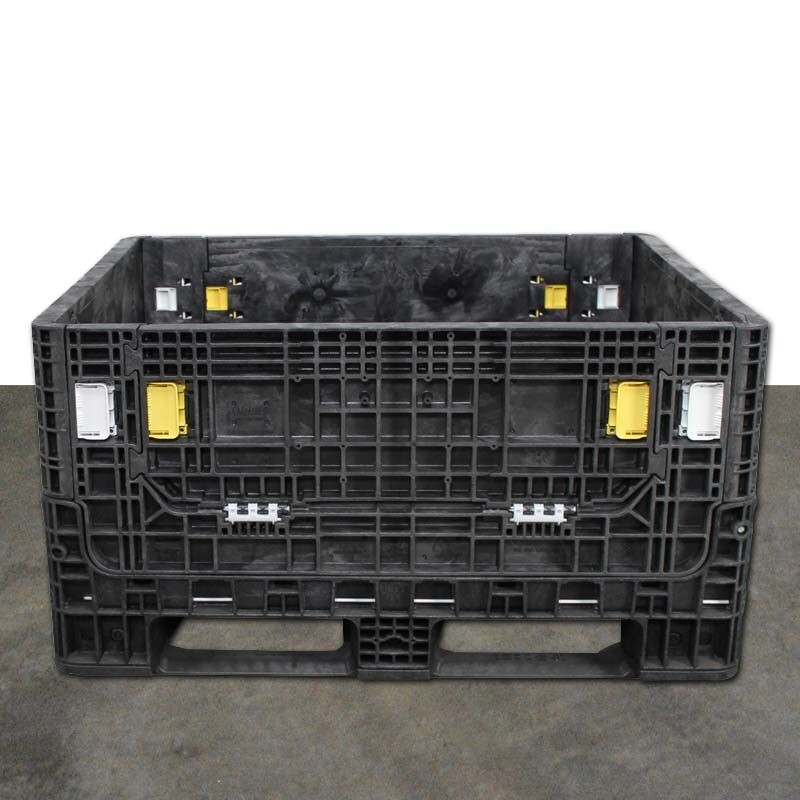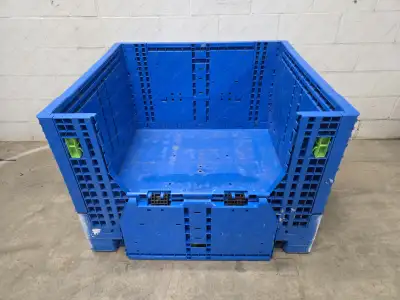Why Bulk Containers Are Crucial for Cost-efficient and sustainable Transportation
Bulk containers play an essential role in modern-day logistics. They facilitate the reliable movement of big quantities of goods, thereby maximizing transportation procedures. This method not just lowers costs yet also lessens environmental effect with lower exhausts and waste generation. As markets look for even more sustainable techniques, the adoption of bulk containers is becoming significantly considerable. What ramifications does this change hold for future logistics and supply chain monitoring?

The Advantages of Making Use Of Bulk Containers in Logistics
Mass containers transform logistics by enhancing effectiveness and sustainability. These containers permit for the transportation of huge quantities of products in a solitary journey, substantially decreasing the number of journeys needed. This not only streamlines procedures yet additionally minimizes labor prices related to handling, loading, and dumping. In addition, bulk containers are made to optimize area usage within transportation cars, making certain that more items can be delivered concurrently.
The standardization of mass containers additionally simplifies the logistics procedure. With consistent measurements, they can be quickly piled and stored, leading to improved stockroom management. Mass containers commonly include long lasting materials that secure materials from damages throughout transportation, therefore reducing item loss and increasing overall reliability. Therefore, organizations can experience enhanced supply chain performance, ultimately leading to increased success and customer satisfaction. This mix of variables makes bulk containers an essential asset in contemporary logistics.
Ecological Influence: Minimizing Waste and Carbon Impact
As sectors significantly focus on sustainability, the fostering of bulk containers has arised as a crucial method for decreasing waste and reducing carbon footprints. These containers minimize the use of packaging products, such as boxes and plastic, therefore significantly decreasing total waste generation. By consolidating shipments, bulk containers improve transport efficiency, permitting for even more items to be moved per trip. This reduction in journeys straight correlates with lower greenhouse gas emissions, adding to a smaller sized carbon impact.
Additionally, bulk containers can usually be recycled or recycled, even more mitigating ecological effect. The toughness of these containers assurances they can hold up against numerous transport cycles, decreasing the requirement for single-use alternatives. refurbished bulk containers. By improving logistics and advertising effective resource use, bulk containers not only support lasting practices yet also encourage markets to straighten with worldwide ecological goals. Eventually, their execution reflects a dedication to ecological stewardship and liable source monitoring
Cost Cost Savings: How Mass Containers Lower Transportation Expenditures
While several firms look for means to boost their lower line, using bulk containers presents a significant possibility for lowering transportation expenditures. Mass containers make best use of the quantity of goods moved, enabling businesses to deliver bigger quantities at as soon as. This effectiveness decreases the variety of journeys called for, straight reducing fuel costs and minimizing labor expenditures connected with loading and dumping.
Furthermore, mass containers often include streamlined styles that maximize area usage within transport lorries. This suggests less voids, resulting in a lot more effective use available capacity. Moreover, the sturdiness of mass containers can reduce the threat of product damage during transportation, decreasing losses and making sure that more goods get here intact.
Enhancing Supply Chain Effectiveness With Bulk Storage Space Solutions
Mass storage space options play an important duty in boosting supply chain performance by enhancing supply management. By consolidating products into less, larger containers, services can substantially decrease handling expenses related to regular transfers and processing. This structured technique allows for much better monitoring and monitoring of supply, inevitably resulting in improved functional performance.
Structured Supply Monitoring
Reliable supply management is crucial for enhancing supply chain procedures, particularly when companies embrace bulk storage services. These remedies allow businesses to preserve higher supply degrees while minimizing the regularity of replenishment. By combining materials into bulk containers, companies can simplify their stock procedures, minimizing the complexity associated with tracking several smaller sized bundles. This method assists in precise inventory counts and boosts projecting accuracy, enabling more enlightened decision-making. Additionally, bulk storage solutions streamline storage facility organization, making it less complicated to situate and gain access to products when needed. Because of this, organizations can achieve a more reliable inventory turnover rate, ultimately enhancing general supply chain efficiency and reducing the probability of stockouts or overstock circumstances.

Reduced Handling Prices
The application of bulk storage services not only streamlines supply monitoring yet likewise significantly lowers managing costs throughout the supply chain. By settling materials into bulk containers, business decrease the demand for constant handling and transfer in between various storage space and transportation units. This approach cuts down on labor expenses related to loading, unloading, and relocating smaller packages. In addition, mass storage space reduces the regularity of deliveries, resulting in reduced transport costs and reduced gas consumption. As a result, companies can optimize their logistics procedures, enabling a more effective allocation of resources. Eventually, lowered dealing with prices contribute to enhanced overall supply chain efficiency, fostering an environment that sustains both sustainability and financial practicality.

Adaptability of Bulk Containers Across Numerous Industries
Although lots of industries have distinctive needs for transport and storage space, mass containers have actually emerged as a versatile remedy that meets a large range of demands. These containers, ranging from huge containers to specialized containers, can fit diverse materials, including liquids, powders, and granules. In the farming market, bulk containers facilitate the transport of fertilizers and grains, while the food and beverage market utilizes them for ingredients and completed items. The chemical industry relies upon bulk containers for safely transferring unsafe materials, making certain conformity with security regulations. In addition, construction firms take advantage of mass containers for carrying accumulations and various other products. Their adaptability extends to different settings of transport, including vehicles, trains, and ships, boosting logistical efficiency. This versatility not just improves operations throughout different markets but likewise advertises sustainability by lowering product packaging waste and maximizing space in transportation. Therefore, bulk containers play a necessary duty in modern-day supply chain management.
Future Fads wholesale Container Use and Sustainability
The future of bulk container usage is significantly formed by ingenious products development that boosts sustainability. Furthermore, automation in logistics promises to improve operations, reducing waste and improving effectiveness. Welcoming circular economic climate practices will certainly better reinvent just how bulk containers are made, used, and recycled, cultivating a much more sustainable transport landscape.
Ingenious Products Advancement
As industries significantly prioritize sustainability, cutting-edge products growth wholesale containers arises as a significant variable in enhancing environmentally friendly transport remedies. Producers and researchers are discovering biodegradable plastics, recycled compounds, and lightweight metals to lower environmental effect. These products not just reduce waste yet additionally boost fuel efficiency by reducing the overall weight of containers. Additionally, developments in wise materials, which can adjust to varying problems, improve the durability and functionality of bulk containers. The assimilation of these ingenious products straightens with round economy principles, advertising reuse and recycling. As the need for lasting techniques grows, the growth of such materials will play a crucial role fit the future of bulk container use in logistics and transportation.
Automation in Logistics
Substantial advancements in automation are poised to transform logistics and the use of bulk containers, enhancing sustainability in transport. Automated systems, including drones and autonomous automobiles, are improving the activity of bulk containers, lowering the reliance on standard fuel-powered transportation. These innovations optimize transmitting and loading procedures, improving and decreasing vacant miles fuel performance. Furthermore, automated supply management systems enhance tracking and tracking of mass containers, ensuring much better source appropriation and decreased waste. The assimilation of the Internet of Things (IoT) permits real-time information analysis, making it possible for proactive decision-making that straightens with sustainability objectives. As automation proceeds to evolve, it is anticipated to drive better innovations wholesale container use, inevitably supporting more lasting logistics techniques and minimizing the ecological impact of transport.
Round Economy Practices
Innovations in automation are establishing the stage for an extra incorporated method to circular economic climate practices in the domain name of bulk container usage. As markets progressively embrace sustainability, bulk containers are being designed for durability and reusability. This change not only minimizes waste yet additionally improves resource efficiency. Companies are adopting techniques such as closed-loop website systems, where made use of containers are gathered, reconditioned, and reintroduced into the supply chain. In addition, clever modern technologies track container life cycles, promoting much better monitoring and reducing environmental effect. The collaboration between makers, logistics companies, and end-users is essential in developing requirements for sustainable container usage. used plastic containers. Future fads show a growing focus on materials that are recyclable and naturally degradable, further strengthening the round economic climate's concepts wholesale transport

Frequently Asked Inquiries
What Materials Are Mass Containers Typically Made From?
Bulk containers are usually created from sturdy products such as high-density polyethylene, steel, cardboard, and aluminum. These products offer flexibility, defense, and toughness, making them suitable for transporting numerous goods in different sectors effectively.
Just how Do I Pick the Right Dimension Mass Container?
Selecting the appropriate size mass container involves evaluating the volume of products to be moved, taking into consideration managing equipment compatibility, and evaluating storage area requirements. Appropriate size warranties efficiency in transport and lessens waste during delivery.
Are Bulk Containers Reusable or Recyclable?
Bulk containers are frequently reusable, created for multiple journeys, boosting sustainability. Several can additionally be recycled, relying on the materials used. Selecting recyclable alternatives further lowers and sustains environmental goals waste in transport methods.
What Safety Laws Put On Mass Container Transport?
Safety policies for mass container transportation consist of conformity with the Division of Transport guidelines, correct labeling of hazardous products, structural stability assessments, and adherence to weight restrictions to ensure risk-free handling and protect against crashes throughout transportation.
How Can Services Change to Making Use Of Mass Containers Effectively?
Companies can transform to bulk containers by examining existing logistics, training team on handling, investing in suitable tools, maximizing supply monitoring, and collaborating with distributors to guarantee compatibility and effectiveness throughout the supply chain.
As sectors increasingly prioritize sustainability, the adoption of bulk containers has arised as a crucial technique for reducing waste and lowering carbon footprints. By settling products right into mass containers, firms can enhance their supply processes, decreasing the intricacy associated with tracking several smaller packages. As markets increasingly prioritize sustainability, cutting-edge materials advancement in bulk containers arises as a substantial variable in enhancing eco-friendly transportation solutions. Automated systems, consisting of drones and self-governing vehicles, are simplifying the activity of mass containers, lowering the dependence on conventional fuel-powered transport. In addition, automated inventory management systems improve tracking and tracking of mass containers, ensuring much better source appropriation and reduced waste.